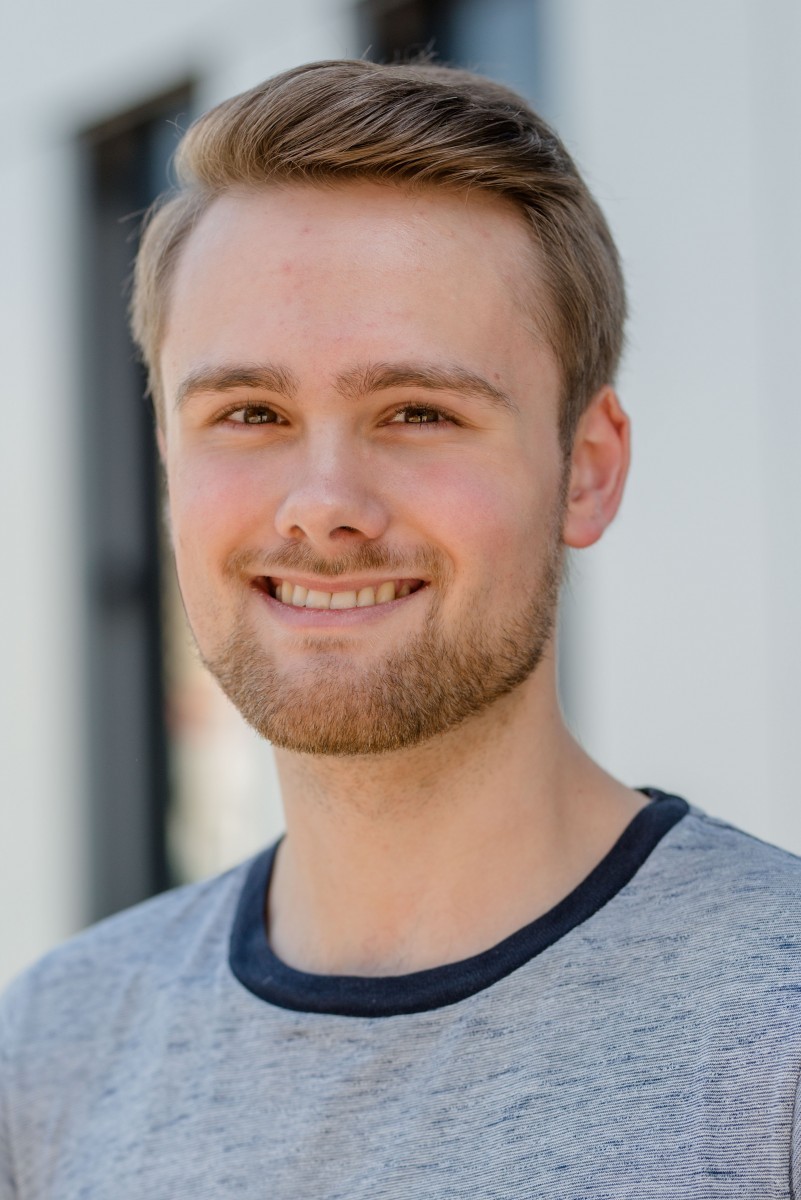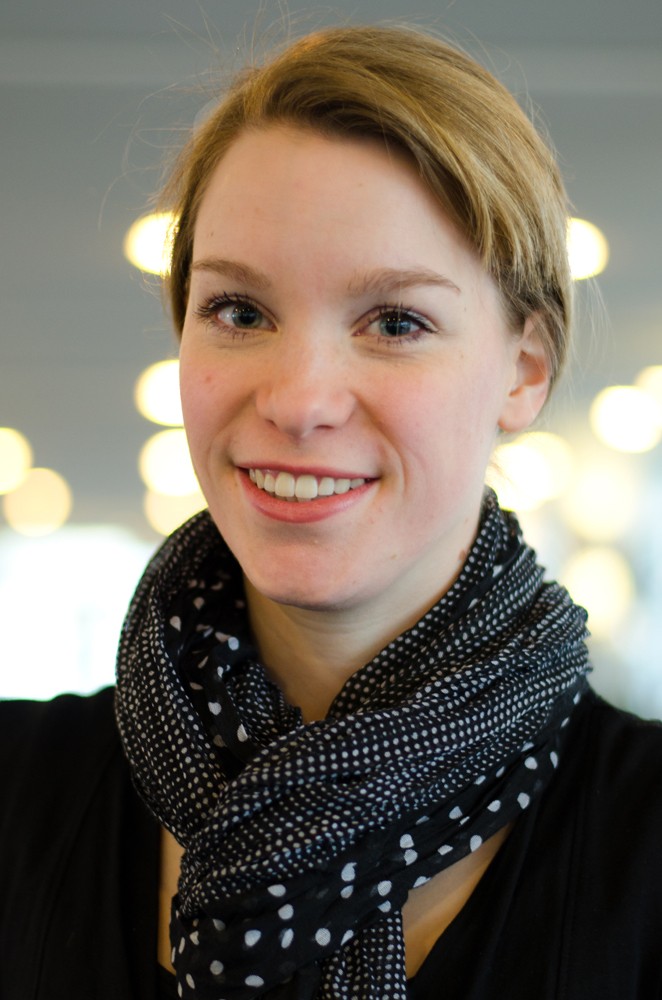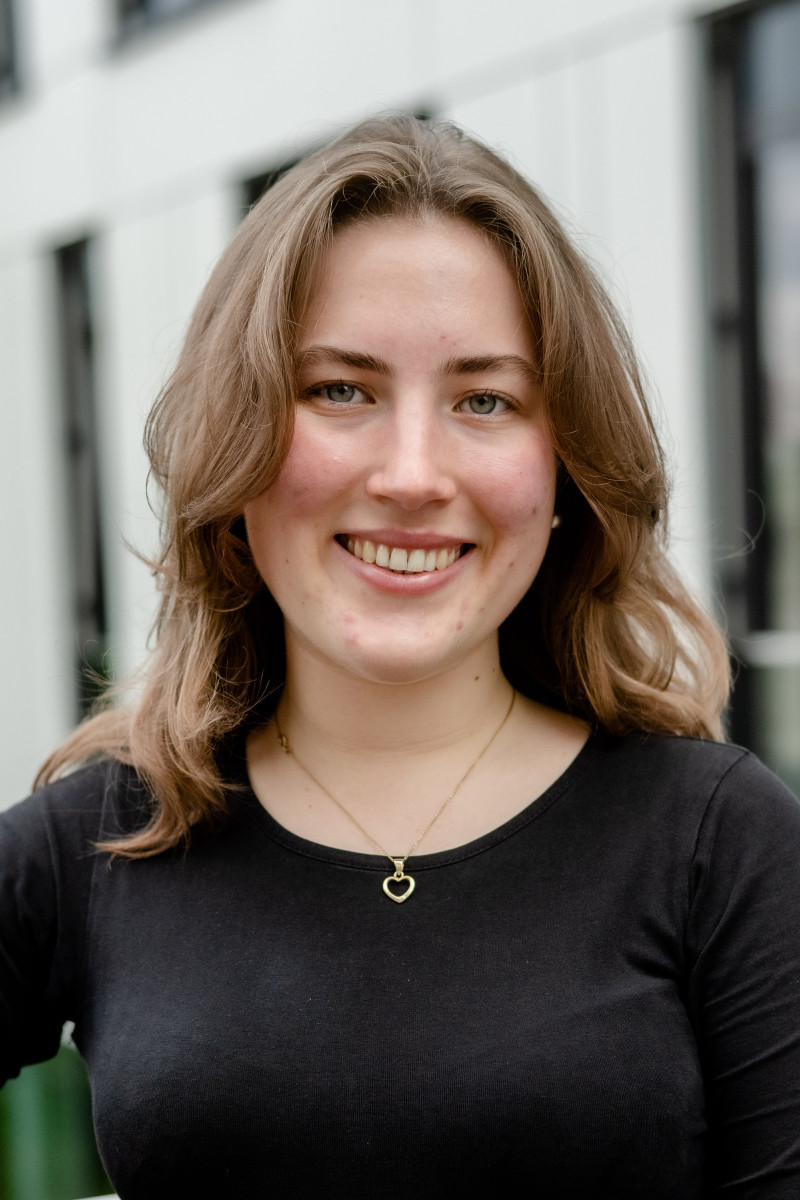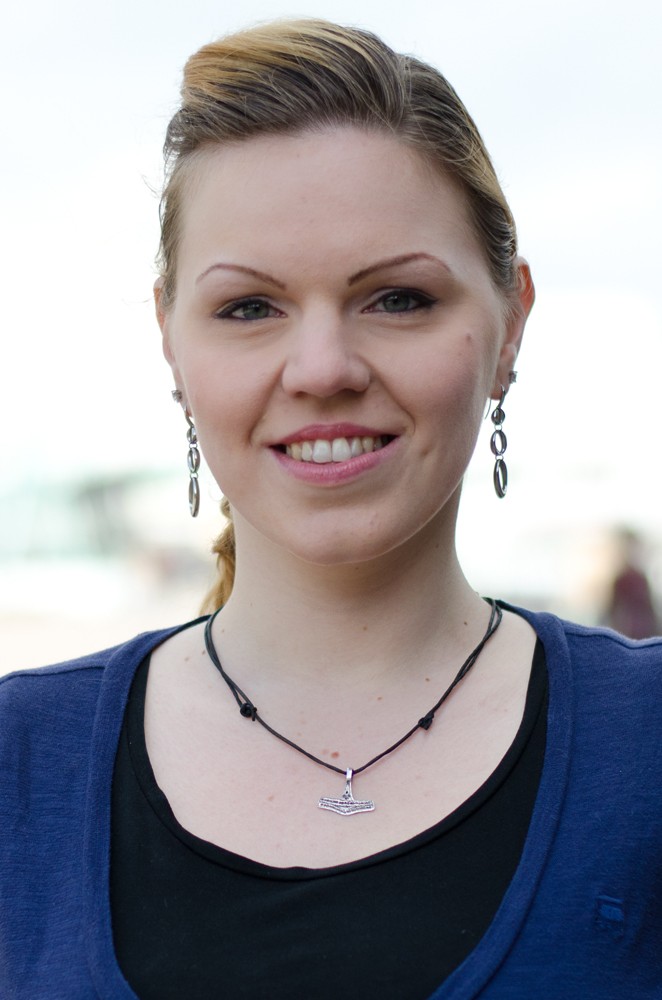What made you choose this degree programme?
I knew early on in my school years that I wanted to study, but for a long time I didn't know which subject. At some point I heard about the course of biochemistry and since I found the subjects of biology and chemistry very interesting at school, I thought it would be a good fit.
In which respect have or haven’t your expectations been fulfilled?
To be honest, I had no real expectations of the biochemistry course. However, I was pleasantly surprised to find that we spend an incredible amount of time in the lab and can apply much of the theory we learn in practice. In addition, I really didn't expect that I would enjoy studying so much and that I would feel so comfortable in our faculty. The support, the cohesion and the helpfulness of my fellow students is really incredible. I have met many wonderful people who have become incredibly important to me in a very short time.
Which aspect of your degree programme do you enjoy most?
What I enjoy most about biochemistry is that I get to work with equipment and substances that I would never have had access to otherwise. It is also very fascinating to learn how the body is structured and which metabolic pathways and reactions take place to keep us alive.
What has been your biggest challenge to date?
For me, the biggest challenge so far has been finding a good balance between my studies and my life outside of them. I spend a lot of time at university, not only to study, but also to spend time with friends. Nevertheless, it is important for me not to lose sight of my own hobbies and not to overload myself. In addition, studying can be stressful, especially during the exam periods. I had to learn to deal with that, too. Sports and exercise in general always help me a lot. Or just go out to Lake Kemnader, take a walk and switch off a bit.
What would you like to become after completing your degree?
I don't yet have a concrete idea of what I would like to do later after graduation. I am now in my 4th bachelor's semester and plan to do my master's later. So much time will pass until I'm done with that. I like to stay flexible, as far as that goes, so I can work with whatever comes my way later. But it definitely reassures me that no matter what I want to do later, I'll definitely have a backup. Until then, however, I'm enjoying my life as a student.
Which advice would you like to give to students who consider enrolling in this degree programme?
If someone is considering studying biochemistry and is not sure, I would definitely give the tip that motivation is the most important thing. Anyone who has the basic interest and willingness to invest a lot of time in the study is right in this study. Of course, it is an advantage if you are particularly good at scientific subjects, or already have prior knowledge about the topics that will be covered, but it is not necessary, because in each subject the basic knowledge is covered at the beginning, so that everyone is on the same level of knowledge. There are some I know who study biochemistry even though they dropped chemistry in 9th grade at school. So that is not at all indicative of whether one would do well in biochemistry. Interest and motivation are the most important things.

Daniel Eggerichs is pursuing the Master of Science degree, 1-subject programme.
What made you choose this degree programme?
I knew in the 11th grade that I would definitely study a natural science. I eventually opted for the degree course in biochemistry, because biochemists have good career chances and it is also possible to effect a lot as an individual. After all, chemistry is in everything that surrounds us. As I have always been fascinated by chemistry in biological applications, I wanted to become a “drugs developer” – a naïve way of putting it, the way you think at school. I never regretted this decision. My goals might have changed since then, but the dream of the countless opportunities offered by biochemical research has remained.
In which respect have or haven’t your expectations been fulfilled?
I must admit, I didn’t have any clear expectations when I took up my degree course; I have taken it in stride. A pleasant surprise were the many practical exercises and the high chemistry percentage. You spend one third of your degree course in the lab and conduct experiments of all kind. Not only is this great fun, but it is also a huge upside when compared with other degree courses or universities. Moreover, I’m not a huge fan of plants, animals and all creatures great and small, and so I was very happy that the biological principles were soon broken down to the underlying chemical processes, without having to study the organism as a whole. It should definitely be noted that biochemistry at RUB is very much a chemistry discipline.
Which aspect of your degree programme do you enjoy most?
As mentioned above, working in the lab – which is part of the degree course – is what I enjoy most. More often than not, you work in small groups with other students so that you’ll soon find yourself part of a true fellowship. This happens also because the degree course is very small, with only approx. 80 students, and so you really get to know everybody. Together, you won’t just make it through every internship, but you will also make the best of every situation and will struggle through the difficult periods together.
What has been your biggest challenge to date?
The greatest challenge in this degree course is setting up an excellent time management strategy. You might have to deal with lectures, seminars and internships all at the same time. Then, your time management must be very good, in order to master all tasks within a limited period of time.
What would you like to become after completing your degree?
After learning a broad range of scientific principles in my Bachelor’s degree, I am now specialising in one discipline in my Master’s degree. I’m going to focus on the genetic aspects of biotechnological processes, especially the optimisation of catalytic enzymes as a branch of prokaryote genetics and biotechnology. Or to put it in simpler terms: I want to modify bacteria genetically so that they’ll produce, for example, drugs, thus rendering expensive technical production unnecessary.
Which advice would you like to give to students who consider enrolling in this degree programme?
Biochemistry is a highly demanding and time-consuming degree course. What you need is, first and foremost, a great deal of motivation and enthusiasm for the tiniest processes of life and their effects on the thing as a whole. Moreover, you should have something of an inquiring mind and the desire to make the world a better place. As long as you maintain a level of motivation for the subject and if you are not discouraged by setbacks, you can do it – regardless how much prior knowledge you have from school. My advice: Hang in there and never underestimate how much material is covered in the lectures

Kathrin Werner is a third-year student of Biochemistry. She is pursuing the Bachelor of Science degree, Major degree.
What made you choose this degree programme?
I did biochemistry at school and found it quite interesting even then.
In which respect have or haven’t your expectations been fulfilled?
I like how we cement out theoretical knowledge through work experience programmes. However, I would have liked to conduct part of my work experience in the industrial sector. But I didn't have time for that as the semester breaks are designated for training programmes at the RUB (e.g. in the lab).
Which aspect of your degree programme do you enjoy most?
Understanding biochemical processes and applying that knowledge in the lab.
What has been your biggest challenge to date?
Setting up my exam schedule – when to write which one in order to have enough time to prepare. For me personally also the exam in the subject “Organic Chemistry II”.
What would you like to become after completing your degree?
I'm not quite sure yet, as there are so many possibilities.
Which advice would you like to give to students who consider enrolling in this degree programme?
Don't let all that chemistry scare you off and carry on!
What made you choose this degree programme?
Originally, I wanted to develop a moisturiser for hyperallergenic and highly sensitive skin. However, our daily life is chock-full with biochemistry. I wanted to find answers to questions such as “Does this anti-wrinkle cream really reduce wrinkles or is that just an advertising claim?”, “Do I really lose weight with diet products?”, “How do I find the right and healthy diet?”, “Why do I have to put salt in the dishwasher?”, “Why are clothes washed with Persil whiter?” This degree course helped me find them.
In which respect have or haven’t your expectations been fulfilled?
I have gained a better understanding of things that I encounter in my daily life – for example why it is better to wash dishes with hot water / washing-up liquid, or why food stored in the fridge remains fresh for longer. I know now what kind of ingredients my face cream contains and whether I might be intolerant to them. With the knowledge gained in the degree programme I changed my diet and have sustainably lost eight kilogrammes. Afterwards, you can certainly say: “I have studied and understood something difficult. I can be proud of myself!” Biochemistry at the RUB is very chemistry-focused and much more maths-focused than I thought. I would have wished for more physiology/medicine and more explanations how it all relates to the human body. You are often left alone with your problems and have to find a way to master the comprehensive curriculum. Prep courses cannot replace a solid knowledge acquired at school (advanced courses in maths, chemistry and physics).
Which aspect of your degree programme do you enjoy most?
The biochemistry lectures. Having mastered it all in spite of obstacles and harassments. Understanding at last the meaning behind the ingredients in creams, shampoos and bath additives and amazing my friends with explanations why a certain cream/shampoo/laundry detergent is better than the others.
What has been your biggest challenge to date?
The organisation. In Bochum, a degree programme in natural science is laid out for students who live in Bochum and who don't have to work. None of this applies to me. The requirements are very high at all times! Attendance is compulsory a lot of the time; schedules often overlap and are changed in the last minute. Semester breaks are virtually non-existent due to exams and internships that take place then. If you have to catch up on materials covered in a previous semester, it screws up your time management. Actually, this degree programme pushes you to your limits – physically, mentally, as well as in terms of time and money!
What would you like to become after completing your degree?
I have given up on my initial plan of becoming a researcher, as I consider myself more of an all-rounder. I would like to work as a business consultant, preferably in the chemistry, pharmaceutical or cosmetics industry.
Which advice would you like to give to students who consider enrolling in this degree programme?
In the sixth grade: chose advanced courses in mathematics, chemistry and physics. Surprisingly enough, biology is not quite as important. Move to Bochum and set up a sustainable financial plan in good time. Revise everything while the semester is ongoing. The first two semesters provide the basics. The third semester begins to draw on your reserves. The fourth semester is when it gets interesting. Prepare for three years without any spare time. Be able to self-organise. Get all relevant information, especially the examination regulations, in good time. And most importantly: make sure you find the discipline enjoyable and interesting – if you don't, you will soon fail.









